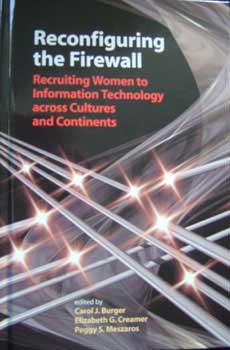Three professors publish on recruiting women to information technology

A comprehensive volume authored by three Virginia Tech professors, "Reconfiguring the Firewall" addresses the global challenge of recruiting girls and women into majors and careers in information technology.
Published by AK Peters, Ltd, and written and researched by Carol J. Burger, Elizabeth G. Creamer, and Peggy S. Meszaros, all faculty members in the College of Liberal Arts and Human Sciences, this book delves into how these recruiting challenges vary across cultures and regions.
The results of the studies are both illuminating and prescriptive for designing and implementing successful programs that cross the secondary, post-secondary, and professional settings, and for establishing an agenda of critical areas for future research about women and information technology.
“A must read for anyone interested in encouraging girls and women in the world of IT,” said Londa Schiebinger, director of the Clayman Institute for Gender Research at Stanford University.
This examination of women’s interest in information technology in a cross-cultural context contains practical suggestions to promote the recruitment and retention of women in IT, spanning early education to careers, ideal for: college faculty, and advisors who implement activities and programs designed to promote the success of women in science and engineering, and those who fund these programs; academic researchers and K-12 educators; and IT industry professionals committed to a diverse workforce.
About the Authors
Carol J. Burger is associate professor at the Department of Interdisciplinary Studies and coordinator of the Science and Gender Equity Program at Virginia Tech. She is the founder and editor of the Journal of Women and Minorities in Science and Engineering, now in its 10th year of publication.
Elizabeth G. Creamer is professor of educational research in the Department of Educational Leadership and Policy Studies at Virginia Tech, and Director of Research and Assessment for VTAdvance, a project funded by the National Science Foundation to advance the climate for women in science and engineering.
Peggy S. Meszaros is the William E. Lavery Professor of Human Development and Director of the Center for Information Technology Impacts on Children, Youth, and Families at Virginia Tech. She has published over 80 scholarly articles and book chapters.
Meszaros also edited New Directions for Teaching & Learning #109 in 2007. This volume is entitled “Self-Authorship: Advancing Students’ Intellectual Growth” and addresses the limitations of national efforts to focus students’ intellectual develop¬ment narrowly on testing. It explores why educators in higher education should consider using the lens of self-authorship and the Learning Partner¬ships Model for a more holistic model of student intellectual development.
Chapters in this volume (published by Jossey-Bass) provide examples of institutional transforma¬tions needed to support change in teaching and learning and examples of assessment, research, and curricular development based in self-authorship theory. The summary chapter by Marcia Baxter Magolda ties the themes from each of the chapters together and offers promise for the future. The final chapter provides ideas for next steps in promoting the use of self-au¬thorship to advance the intellectual development of college students.
The audience for this volume is broad, ranging from college faculty to student affairs faculty and staff to college administrators who are facing as¬sessment challenges for reporting student learning outcomes to their vari¬ous constituencies, agencies, and boards. This volume should also prove instructive to faculty embarking on curriculum revisions and identifying and measuring student learning outcomes for undergraduate and graduate students.
The College of Liberal Arts and Human Sciences embraces the arts, humanities, social and human sciences, and education. The College nurtures intellect and spirit, enlightens decision-making, inspires positive change, and improves the quality of life for people of all ages. It is home to the departments of Apparel, Housing & Resource Management; Communication; English; Foreign Languages & Literatures; History; Human Development; Interdisciplinary Studies; Music; Philosophy; Political Science; ROTC; Science and Technology in Society; Sociology; Theatre Arts; the School of the Arts; and the School of Education.




